This week we conclude our ‘Summer Series’ with a final group, this time of five apostles, with very varied if obscure lives.
James the Less
The profusion of persons named James surrounding Jesus in the years of his public life led in time to a sense of confusion, which the writings of the Fathers of the Church, of other commentators, and of modern scholars have done very little to untangle.
It is little wonder that the cults of the saints came into disrepute at the time of the Reformation and have not revived among some Christian persuasions of today.
Yet as one reads through these valiant efforts to cast light into dark places, which humans always like to do, one senses what a loss a knowledge of the saints would be. This is especially true of the Apostles.
They provide a substantial image of faith in action, which is always instructive and very inspiring, whatever confusions remain.
As with the Jameses, a large part of the trouble about knowing about these saints arises from the several Marys that are referred to in the New Testament. We must always bear in mind in Marian disputes that ‘Mary’ was a very common name in those days in Palestine, so that it simply does not mean that when a Mary is referred to the reference is to Mary the mother of Jesus.
But to return to what might be a little more certain, here are the facts about James son of Alpheus. He is generally identified with the references to James the Less. He is mentioned only four times in the New Testament. This tradition is emphasised by St Jerome, which gave it great authority, but the matter is still debated by recent scholars.
How James died is also unclear, though he is often shown carrying a fuller’s club, a heavy working implement of wood, which might suggest he was clubbed to death, which is confirmed in fact by some early sacred images of the saint.
A later tradition claimed he was put to death on a cross while teaching about Jesus at a place in Lower Egypt. There is really no certainty about any of this. But we still have what we are told in the scriptures.
Thaddeus Judas (St Jude)
The tradition arose, so it is said, that in the Middle Ages many Christians were afraid, because of the confusion of names, that in praying to Thaddeus as one of the Apostles, they might be praying to Judas the betrayer of Jesus.
Hence he became for a time a quite neglected saint. But then people came to believe (for this is a popular tale) that because so few prayed directly to him, the saint became anxious to help those few who did so, even in the most hopeless of cases.
Hence arose the prayers that are used in a devotion that remains one of those aspects of traditional Catholicism that so many are sad to have seen decline or disappear.
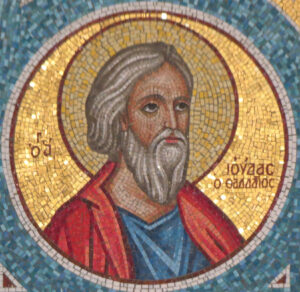
Perhaps they are right, for it encourages people not to give up hope, nor to simply despair. To do something about a situation, St Jude in fact encourages people to take action, and so to take command of their lives in a new way. And all of that cannot but be a good thing.
Yet novenas to St Jude, such as those held in Dublin’s Whitefriar’s Street, can be quite crowded. We should remember that a saint such as St Jude was an important if mysterious figure to Irish people of earlier generations. Little may be known about St Jude, but that does not mean he should therefore be forgotten.
But to return to the historical Thaddeus Judas. A later tradition says he went to the city of Edessa, where he cured Abgar the King. Eurabbies in 4th Century claimed that there were full records of him in the royal archives there. But these are lost.
But it should not be overlooked, amid this welter of legend and tradition and pious belief, that there is an important occasion on which Thaddeus appeals to Jesus to make clear to the Apostles his mission.
In John (14:22-23), at the Last Supper, Thaddeus Judas in all simplicity asks Jesus, “Lord, how is it that you will show yourself to us and not to the world?”
Jesus answered and said to him, “If anyone who loves me will obey my teaching, my Father will love them, and we will come to them and make our home with them”.
These are the direct words of Jesus to Thaddeus Judas, among the last words he directs to the Apostle. They are more important surely in their significance than all the later traditions, for whatever way one reads them, they go to the heart of the teachings of the gospels and make Thaddeus Judas a more significant person than one might have guessed.
Simon the Zealot
If little is known about some of the Apostles, it can be said that Simon the Zealot is the most obscure. Even the Greek Fathers are silent about him.
His name has led some in recent times to think he was one of those primitive rebels the Romans called the Zealots; with which some writers have associated Jesus too, thinking they were Temple priests.
But the term in this instance must taken to read ‘Simon the Zealous’, that is the enthusiast for the faith.
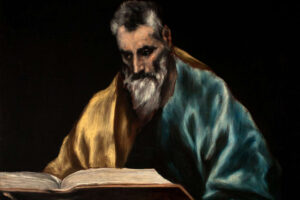
Indeed the saint is almost a case study of the variety of traditions and interpretations possible in scripture history. He is even claimed to have gone to Britain (by those strange obsessionists, the British Israelites) at the time of the revolt of Boudicca of the Iceni and to have been martyred there himself.
However, in Islamic tradition, to which Christian scholars often pay too little attention, he is said to have preached the name of God (rather than the teaching of the Son of Man) to the Berbers outside north Africa, by which seems to be meant those who lived further south in the deserts of Mauretania. This is an idea drawn from the writings of the Greek writer Nikephoros in the 9th Century.
But these are two extreme traditions of a very confused life which was spent according to more mainstream sources in other more familiar missionary fields.
It is a warning to always bear in mind just how limited our knowledge of the early Church is and to be careful about being too rigid in the way we speak about it, in claiming some things would have been impossible. We need often enough to respect our own ignorance.
Bartholomew
St Bartholomew seems to have been close to me, at least in a geographic sense, for much of my life.
When I lived in the City of London (as distinct from Greater London), the great hospital dedicated to the saint, commonly referred to as St Bart’s was where I went to have occasional treatment.
But here in Dublin the connection continues. I live near the Anglo-Catholic Anglican parish church of St Bartholomew’s, whose bells mark off our hours even at night. The church is famous, too, for its fine choir and its music.
So medicine, Catholic faith, music: how are these connected then with the actual apostle? They are in a roundabout way.
The main tradition about the saint is, however, that he went to India like St Thomas, but to the great port of what is now called Mumbai (which was certainly known to Greek geographers in the century of Jesus).
So Bartholomew is another apostle who went to India: that two out of the 12 did so is certainly worth considering. But they went by two very different and distinct routes.
As I have suggested Thomas went by way of the regular seasonal crossing of the Arabian Sea. Bartholomew, to reach Mumbai, would have taken the northern coastal route from the mouth of the Tigris along the coast of Persia, to the mouth of the Ganges.
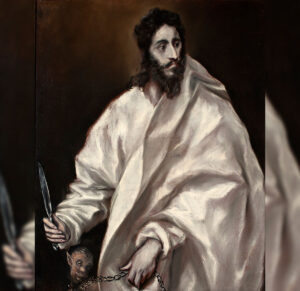
India was the newest place for developing trade: it was calculated at the time that a merchant could make the journey from Italy by sea and land to India in 16 weeks.
The East then seems to have meant more to the first Christians than the West, seems to be the conclusion. We with our Eurocentric views of history might not have thought that. He then returned perhaps along the same route to labour in Greater Armenia.
St Bartholomew’s Hospital (to return to that) was found in 1123 by a city merchant named Rahere. Having suffered a tragic loss he went on a pilgrimage to Rome and while on this he had a vision of St Bartholomew, who told him to return home and to found a hospital outside the city wall of London, but within its suburbs.
This he did, becoming its first prior. The charity he established lasted down to the Reformation. After that it was passed over intact to the City of London, who continued funding as it was, and it has continued to flourish and to grow. This summer is the 900th anniversary of its founding.
But sadly aside from these good things the saint’s name in history is also associated with one of the grimmest events in Church history, the St Bartholomew’s Day Massacre in Paris, so called because it began on the eve of the saint’s feast day in August 1572, when the largely Catholic population of the city set upon their Huguenot neighbours.
This would long remain a crime to be often cast up in the face of Catholic claims of intolerance against them by Protestants. An ugly business for such a saint to have his name linked to.
But such is the history of religion, so that it is reasonable to lay our emphasis of respect on the good things associated with his name. In the end the evil fades, the good things remain, even 900 years later.
Matthias
It was said of St Matthias (by no less an authority than the Catholic Encyclopaedia, whose terminal information date is just after 1900) that aside from the information in the Acts “all further information concerning the life of and death of Matthias is vague and contradictory”.
Of the Gospel of Matthias, mentioned by a few of the Fathers, nothing survives but possibly some sentences. All the rest of his supposed writings are apocryphal.
In the 120 years since nothing has really changed. However this does not take from the basic fact that the man himself is undoubtedly of great importance in the history of the early Church.
After the departure and death of Judas Iscariot, the remaining apostles were faced with a problem. They had all been called by Jesus. Now to make up their number they must decide what to do (Acts I: 21-26).
“‘Therefore, it is necessary that one of the men who accompanied us the whole time the Lord Jesus came and went among us, beginning from the baptism of John until the day on which he was taken up from us, become with us a witness to his resurrection.
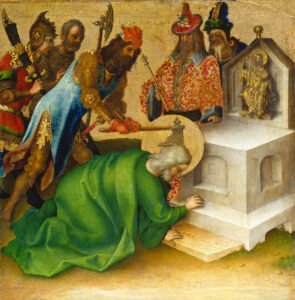
“So they proposed two, Joseph called Barsabas, who was also known as Justus, and Matthias.
“Then they prayed, ‘You, Lord, who knows the hearts of all, show which one of these two you have chosen to take the place in this apostolic ministry from which Judas turned away to go to his own place.’ Then they gave lots to them, and the lot fell upon Matthias, and he was counted with the eleven apostles.”
Later it was emphasised by interpreters that he was one of those upon whom the Holy Spirit descended at the first Pentecost. This event granted the Apostles the gift of tongues, so that when they preached publicly in Jerusalem “every man of them heard them speak in his own tongue”.
This surely is a figure of the need for the Apostles to scatter and carry the new creed to the wider world.
The importance of Matthias historically is that the Apostles had provided for both the continuity and renewal of their new movement. It was from this fact that the idea of a universal Church that Christians hold today sprang.
For this fact alone he should be better remembered.


 Peter Costello
Peter Costello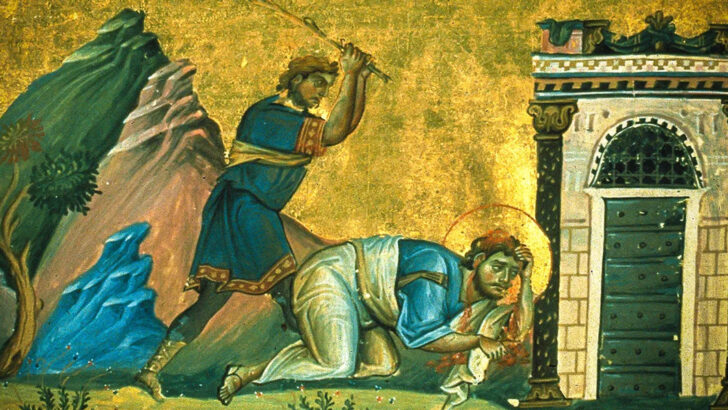 The martyrdom of James the Less in an early Greek image.
The martyrdom of James the Less in an early Greek image. 